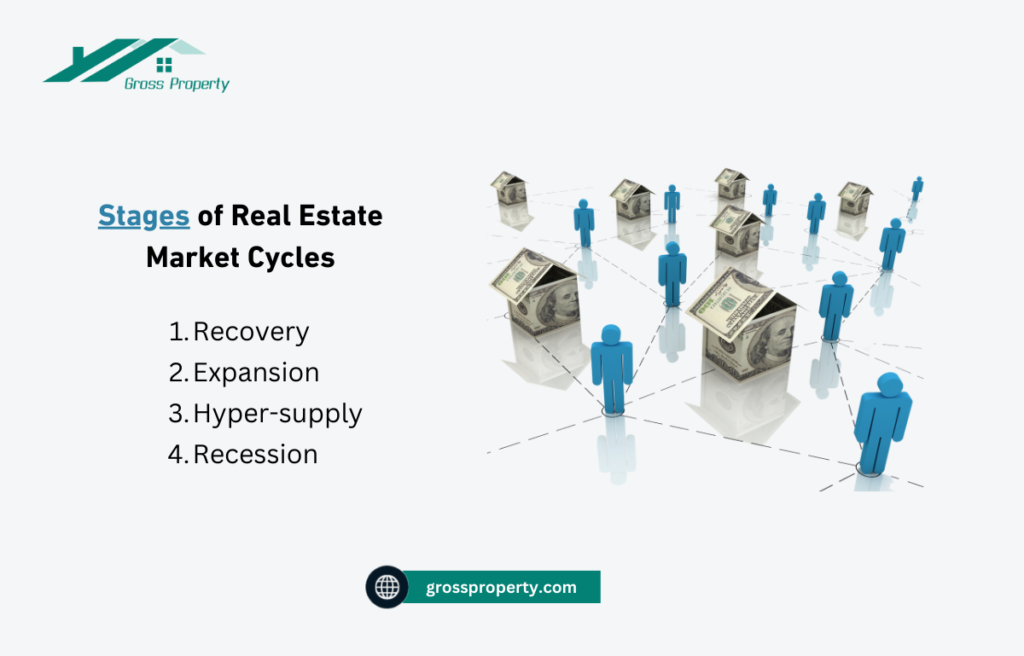The real estate market serves as a dynamic and essential component of global economies, influencing everything from individual financial well-being to larger national economic trends. Real estate market encompasses various types of properties, including residential, commercial, and industrial spaces, each of which is affected by a multitude of factors like economic shifts, interest rates, government policies, and technological advancements. For investors, homebuyers, and real estate professionals, understanding the nuances of the market can provide significant advantages in making informed decisions. As the real estate landscape continuously evolves, staying updated on the latest trends and market drivers is key to success in this ever-changing field.
What Factors Influence the Real Estate Market in 2024?
The real estate market in 2024 will be shaped by a combination of economic, social, and technological factors. One of the most significant influences is interest rates. As central banks adjust interest rates to manage inflation, the cost of borrowing will either rise or fall, directly impacting homebuyers and investors. Lower interest rates tend to make borrowing more affordable, leading to increased demand for housing, while higher rates can dampen demand as loans become more expensive.
Government regulations and policies, such as property taxes, zoning laws, and subsidies for homebuyers, will also play a pivotal role in the 2024 market. For example, changes in property tax legislation or new incentives for first-time homebuyers can either stimulate or slow down the real estate market. Environmental considerations, particularly policies encouraging sustainable development, are becoming increasingly influential as governments push for greener building standards.
Lastly, demographic shifts, such as urban migration, aging populations, and changes in family structure, are expected to drive demand in different segments of the market. For instance, the rising preference for urban living, combined with a surge in remote work, will affect housing demand in both cities and suburban areas.

How Do Interest Rates Impact Property Prices in Urban and Rural Areas?
Interest rates have a profound impact on property prices, affecting both urban and rural real estate markets. In urban areas, where property prices are generally higher, fluctuations in interest rates can have a more immediate and visible effect. A slight increase in interest rates can significantly raise monthly mortgage payments, discouraging potential buyers and reducing the demand for housing. This drop in demand can lead to price stabilization or even declines in property values, especially in highly competitive markets.
In rural areas, the impact of interest rates is also noticeable, though often less dramatic. Property prices in these regions tend to be lower, so the effect of changing interest rates on mortgage payments is relatively smaller. However, rural areas might experience an uptick in demand as rising interest rates make urban properties less affordable, prompting buyers to explore more affordable housing options outside of major cities.
What Are the Most Profitable Types of Real Estate Investments Today?
In 2024, residential rental properties continue to be one of the most profitable types of real estate investments, especially in high-demand urban areas. With rising housing prices and mortgage rates, many people are turning to renting rather than buying, which creates an opportunity for investors to capitalize on rental income. Additionally, vacation rentals have seen increased demand as global travel resumes, making short-term rentals a lucrative option in tourist destinations.
Another profitable investment avenue is commercial real estate market, particularly in sectors like logistics and warehousing, driven by the continued growth of e-commerce. Retail spaces, although hit hard during the pandemic, are also experiencing a resurgence, especially for essential services and businesses that have adapted to a more hybrid shopping model. Industrial real estate market is also in demand, as global supply chain disruptions have pushed companies to seek more localized production and storage facilities, leading to higher returns in this sector.
What Are the Key Differences Between Residential and Commercial Real Estate Market?
Residential and commercial real estate market differ in several key ways, including their purpose, investment strategy, and market dynamics. Residential real estate market is primarily concerned with housing and includes properties like single-family homes, condominiums, and apartments. Demand for residential real estate is often driven by population growth, economic conditions, and changes in household formation. It’s also generally more influenced by emotional factors, as buyers often consider the property as a home rather than just an investment.
On the other hand, commercial real estate market includes properties used for business purposes, such as offices, retail spaces, and industrial buildings. Commercial properties are primarily evaluated based on their ability to generate income, with factors such as location, tenant quality, and rental yields being critical. Investors in commercial real estate often focus on long-term leases, ensuring steady cash flow, whereas residential real estate investors may rely more on property appreciation and rental turnover.
Another key difference lies in financing and regulatory environments. Commercial real estate market transactions usually involve larger sums of money, more complex financing structures, and different types of regulations compared to residential real estate. Commercial investments are typically riskier but can offer higher returns, especially in prime locations. Residential properties, while generally offering lower yields, provide more stability, particularly in times of economic uncertainty.
How Is the Global Real Estate Market Evolving Post-Pandemic?
The global real estate market has undergone significant changes in the post-pandemic era. One of the key trends is the increased demand for remote-friendly housing as remote and hybrid work models have become a norm. This shift has led to a growing interest in suburban and rural properties where buyers can afford larger homes with dedicated office spaces, as people no longer need to be in proximity to urban centers for work.
Moreover, the demand for sustainable and green buildings has grown, as both investors and homebuyers are more focused on eco-friendly living. Developers are incorporating energy-efficient designs, renewable energy sources, and sustainable materials to attract this environmentally-conscious market.
Lastly, the commercial real estate sector has experienced a major transformation, with a shift in demand from traditional office spaces to flexible workspaces and co-working environments. The logistics and warehousing sectors have also boomed as e-commerce continues to grow, requiring more space for storage and distribution. These evolving trends highlight the ongoing recovery and adaptation of the global real estate market to a post-pandemic world.
What Are the Future Trends in Real Estate Technology (PropTech)?
PropTech, or property technology, is rapidly transforming the real estate market. One of the most significant trends is the integration of smart home technology, where devices like smart thermostats, security systems, and lighting controls are enhancing the value of properties by offering convenience and energy efficiency. These innovations appeal to tech-savvy buyers and renters looking for modern, connected living spaces.
Another emerging trend is the rise of virtual and augmented reality tools in real estate. These technologies are changing the way properties are marketed and viewed, allowing prospective buyers to take virtual tours of homes from anywhere in the world. This not only expands the reach of real estate agents but also improves the efficiency of the buying process. Additionally, blockchain and smart contracts are streamlining real estate transactions by improving transparency, reducing fraud, and simplifying the process of buying and selling property.
How Can Sustainable Real Estate Development Influence Property Values?
Sustainable real estate market development significantly impacts property values, primarily by increasing demand for eco-friendly and energy-efficient homes. As environmental concerns rise, homebuyers and investors are placing greater emphasis on properties that offer sustainable features such as solar panels, energy-efficient windows, and green building materials. These features not only reduce utility costs for occupants but also align with government incentives and tax breaks, further enhancing the value of these properties.
Moreover, sustainable properties often benefit from a higher resale value due to their long-term cost savings and environmental appeal. Investors who prioritize sustainability are likely to see stronger returns on investment, as eco-conscious consumers seek out homes that offer both financial and environmental benefits. As more cities and municipalities adopt green building codes, properties that meet or exceed these standards are positioned to remain competitive in the real estate market.
What Are the Risks and Benefits of Investing in Rental Properties?
Investing in rental properties presents several benefits, primarily through steady cash flow. Rental properties offer a consistent source of income as long as they are located in areas with strong demand, such as cities with growing populations or areas with robust employment opportunities. Over time, investors can also benefit from appreciation, where the value of the property increases, providing an opportunity to sell for a profit later.
However, rental property investments come with their share of risks. The biggest risk involves tenant turnover and vacancy rates, where prolonged periods without tenants can significantly reduce income and cause financial strain. Maintenance costs can also be unpredictable, as aging properties often require expensive repairs or renovations. Additionally, changes in local rental laws, such as rent control regulations, can cap how much an investor can charge, limiting potential returns.
What Is the Impact of Foreign InveAstments on Local Real Estate Markets?
Foreign investments can have a profound impact on local real estate markets by increasing demand, particularly in high-end or luxury real estate sectors. In many cases, foreign buyers are attracted to stable economies and strong property rights in countries like the United States, Canada, and the UK. This influx of foreign capital often leads to rising property prices, as international investors compete for desirable properties.
However, foreign investments can also create challenges for local buyers by driving up housing costs, making it more difficult for residents to afford homes in certain areas. In some regions, governments have introduced policies or taxes aimed at curbing excessive foreign investment in real estate to ensure that the housing market remains accessible to local populations. While foreign investments can bring economic benefits and support the growth of real estate markets, they also need to be managed carefully to avoid overheating markets and creating housing shortages for local residents.
How Do Location and Zoning Laws Affect Property Value?
The location of a property is one of the most critical factors influencing its value. Properties situated in desirable areas—such as those near good schools, accessible public transportation, and low crime rates—tend to have higher market values and attract more buyers. Furthermore, proximity to amenities like shopping centers, parks, and recreational facilities can significantly increase a property’s attractiveness to potential homeowners or tenants.
Zoning laws also play an essential role in determining a property’s value. Zoning regulations control the types of structures that can be built and how land can be used. Properties located in areas zoned for commercial or multi-family residential use are often more valuable because they offer more flexibility for developers and investors. Conversely, properties in strictly residential zones may have limitations that restrict their development potential, potentially lowering their value.
How Do Real Estate Market Cycles Work, and What Stage Are We in Now?
Real estate market operates in cycles, typically consisting of four main stages: recovery, expansion, hyper-supply, and recession. During the recovery phase, market activity picks up after a downturn, with investors looking for undervalued properties. The expansion phase follows, characterized by rising property values, increasing construction, and heightened demand. When the market reaches hyper-supply, supply begins to outpace demand, often leading to a recession, where property values decline, and vacancy rates increase.
Currently, in 2024, many markets are navigating a transition between expansion and hyper-supply. The post-pandemic demand surge for housing has led to increased property development in several regions, but concerns about rising interest rates and inflation suggest that some markets might be approaching the hyper-supply phase. Investors should keep a close eye on regional trends to anticipate potential downturns.

How Does Inflation Affect the Housing Market?
Inflation has a direct and significant impact on the housing market. As inflation increases, the cost of building materials and construction services rises, which leads to an increase in the overall cost of housing. This makes new homes more expensive to build, driving up property prices, especially in fast-growing urban areas. Additionally, inflation affects the purchasing power of potential buyers, making it more difficult for many to afford a home, which could lead to a cooling of housing demand in some real estate markets.
Furthermore, central banks often respond to inflation by increasing interest rates, which raises the cost of borrowing for homebuyers. As mortgage rates climb, potential buyers face higher monthly payments, reducing their ability to afford homes at current prices. This could cause a slowdown in housing market activity, as fewer people are able to qualify for home loans or are less willing to take on expensive mortgages.
As interest rates rise, both urban and rural buyers may also shift toward rental properties, further influencing the dynamics of the housing market. For investors, higher interest rates typically translate to reduced profit margins, which could lead to slower property development and less aggressive bidding on properties.
What Role Does Government Policy Play in the Housing Market?
Government policies have a profound influence on the housing market, primarily through legislation and economic levers such as taxation, subsidies, and zoning laws. Policies that offer tax breaks or incentives for homebuyers can stimulate demand, as seen with first-time buyer programs. On the other hand, changes in property taxes can either encourage or deter investment in real estate.
Another critical area is zoning laws, which determine what types of buildings can be developed in specific areas. Zoning regulations can either restrict or promote the development of residential, commercial, or industrial real estate, directly affecting property values and market activity. Moreover, housing policies aimed at affordable housing and rent control can have a significant impact on the rental real estate market, influencing both investor behavior and tenant affordability.
What Is the Significance of Property Taxes in Real Estate Investment?
Property taxes play a crucial role in determining the overall profitability of a real estate investment. Higher property taxes can significantly reduce an investor’s cash flow by increasing the expenses associated with maintaining the property. This is particularly important for rental properties, where high property taxes can eat into rental income. Conversely, properties located in areas with lower property taxes can offer better profit margins for investors, as their operating costs are reduced.
Moreover, property taxes are often influenced by local government decisions and can vary depending on the region, which makes it essential for real estate investors to thoroughly research tax policies before making a purchase. Changes in property tax legislation, such as increases to fund local infrastructure or education, can affect the future value and profitability of real estate investments, making property taxes a key factor in the decision-making process.
How Can Real Estate Investors Mitigate Risks During Market Downturns?
Investors can mitigate risks during real estate market downturns by adopting diversification strategies. One approach is to diversify geographically, investing in different regions that may not experience downturns simultaneously. Additionally, investing in various types of real estate—such as a mix of residential, commercial, and industrial properties—helps reduce risk by spreading exposure across multiple sectors.
Another effective risk mitigation strategy is maintaining liquidity. By keeping a portion of their portfolio in cash or easily liquidated assets, investors can weather market fluctuations without having to sell properties at a loss. Long-term leases in commercial real estate also offer protection, as they provide consistent income even during downturns, ensuring a stable cash flow when market conditions are less favorable. Finally, focusing on properties in high-demand locations with resilient rental markets can safeguard against severe devaluation during economic slumps.
How Do Economic Recessions Affect the Real Estate Market?
Economic recessions typically slow down the real estate market, as both housing demand and property values tend to decline during economic downturns. With rising unemployment and reduced consumer confidence, fewer individuals are able to buy homes, leading to an oversupply of properties in the market. Sellers may need to lower prices or offer incentives to attract buyers, which can further depress home values.
However, real estate market also presents opportunities during recessions, particularly for savvy investors. As property prices fall, investors with available capital may find opportunities to purchase undervalued assets that will appreciate in value as the economy recovers. Recessionary periods may also see a shift in demand toward rental properties, as individuals unable to buy homes seek out rental options, making this a resilient segment of the real estate market during tough economic times.
How Does Population Growth Drive Demand in the Housing Market?
Population growth is one of the most critical drivers of housing demand. As the population increases, more individuals and families require housing, leading to higher demand for both rental properties and homes for sale. This increase in demand typically leads to rising property prices and rents, especially in regions experiencing rapid population growth due to economic opportunities or migration trends. In urban areas, where land is limited, population growth can significantly increase housing prices, making it more challenging for buyers to find affordable options.
In addition to driving housing demand, population growth can also spur new construction and development projects, as developers seek to capitalize on the increased need for housing. Regions experiencing population booms often see a rise in residential projects, which can contribute to the growth of local economies and increase the overall availability of housing options.
What Is the Process of Buying Property in Emerging Markets?
Investing in real estate in emerging markets offers significant opportunities but also comes with unique challenges. The first step in buying property in these real estate markets is conducting thorough due diligence to understand the local legal and regulatory environment. Real estate laws can vary widely from one country to another, and it’s essential to work with local legal professionals who can guide investors through the process and ensure that all transactions comply with local regulations.
Emerging markets also often have less developed infrastructure and legal protections, which can increase the risks associated with real estate investments. For example, issues such as unclear property titles or disputes over land ownership may arise, making it important for investors to work with trusted local partners and conduct in-depth research before purchasing property. Despite these risks, investing in emerging markets can offer higher returns, as property prices are often lower, and these regions may experience rapid economic growth and urbanization, leading to property value appreciation over time.
What Are the Best Strategies for First-Time Homebuyers in a Competitive Market?
First-time homebuyers in a competitive real estate market can improve their chances of securing a property by taking a few strategic steps. One effective strategy is to get pre-approved for a mortgage before starting the home search. This not only provides clarity on the buyer’s budget but also signals to sellers that the buyer is serious and financially ready to make an offer. Pre-approval can help buyers move quickly when a desirable property becomes available, giving them an edge over competitors.
Additionally, working with a knowledgeable real estate agent who understands the local market can be invaluable. Agents can provide insights into neighborhood trends, advise on competitive bidding strategies, and help buyers navigate the fast-paced environment. Buyers may also benefit from being flexible with their offer terms, such as adjusting the closing timeline or contingencies to make their offer more attractive without necessarily raising the price.

What Is the Role of Real Estate Agents in Today’s Digital Market?
In today’s digital market, real estate agents play a crucial role in navigating the wealth of information available online while providing personalized, expert guidance to buyers and sellers. While digital platforms allow consumers to research listings, neighborhood data, and market trends independently, real estate agents offer invaluable insights into local market conditions, pricing strategies, and contract negotiations that can’t be easily replicated online.
Moreover, agents are increasingly using digital tools such as virtual tours, online marketing campaigns, and transaction management platforms to enhance the buying and selling process. By leveraging these technologies, real estate agents help streamline transactions, ensuring that clients have a seamless experience from property search to closing. Even in a digital-first world, the role of the agent remains critical in offering personalized service, expert advice, and local knowledge that complements the vast resources available online.
In conclusion, the real estate market remains a vital and ever-evolving component of the global economy, with various factors such as interest rates, government policies, demographic shifts, and technological advancements shaping its trajectory. As we look ahead to 2024 and beyond, it’s clear that understanding these dynamics is crucial for both investors and homebuyers alike. The growing integration of sustainability, the rise of PropTech, and the shifting preferences driven by post-pandemic realities will continue to define the market’s future.
For those looking to invest or make decisions in real estate, staying informed about the market’s key trends—such as the impact of inflation, the role of government policy, and the influence of interest rates—is essential. Whether it’s navigating the residential or commercial sectors, understanding the real estate cycles, or adapting to new opportunities in emerging markets, success hinges on being proactive and well-prepared. As the market continues to recover and adapt, leveraging these insights can help individuals and businesses make informed, profitable decisions.
The real estate market’s dynamic nature underscores the importance of adaptability. Investors, homebuyers, and real estate professionals must stay informed and agile, ready to navigate the challenges and seize the opportunities presented by this constantly shifting landscape. As the real estate market evolves, those who can anticipate and respond to these changes will be best positioned for success.











